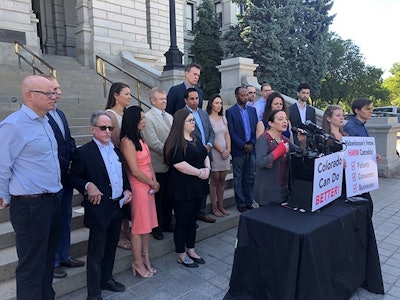
Top photo: Rep. Edie Hooton, who sponsored a bill to add autism to Colorado's medical marijuana program, speaks at a June 7 news conference in response to Gov. John Hickenlooper's veto of the autism legislation, as well as two other cannabis-related bills. Also in attendance were Michelle Walker, director of the Colorado state chapter of Mothers Advocating Medical Marijuana for Autism (MAMMA); Rep. Dan Pabon; Sen. Tim Neville; Rep. Kevin Van Winkle; Marijuana Industry Group’s executive director, Kristi Kelly, and chairman, Bruce Nassau; Christian Sederberg of the Vicente Sederberg law firm; and Cannability Foundation Executive Director Stacy Lynn. Photo courtesy of Mason Tvert/Marijuana Policy Project.
Cannabis advocates in Colorado are disappointed following Gov. John Hickenlooper’s rapid-fire vetoes of bills that would have added autism to the state’s medical marijuana program, permitted licensed marijuana “tasting rooms” and helped cannabis businesses access out-of-state capital.
House Bill 1263 was introduced by Rep. Edie Hooton in March and was originally designed to add acute pain to the state’s list of medical marijuana conditions. However, before the bill’s introduction, mothers and advocates of children suffering from autism spectrum disorders approached Hooton and persuaded her to add the condition to her bill. When House committee members told Hooton they would not vote for the bill if acute pain remained part of the measure, Hooton removed it, and the legislation passed through the state legislature largely uncontested, although groups including the Colorado Child and Adolescent Psychiatric Society, Colorado Psychiatric Society, Children's Hospital Colorado and Colorado Department of Public Health and Environment opposed it, citing the lack of clinical research.
“There was strong bipartisan support for the bill to add autism as a qualifying condition for medical marijuana,” Mason Tvert, spokesperson for the Marijuana Policy Project, told Cannabis Business Times. “It passed in the House 53-11 and in the Senate 32-3. It was strongly supported, and … throughout the months-long process of developing the legislation and introducing it and all of the dialogue surrounding it, no concerns were expressed by the governor or his office about that legislation.”
It wasn’t until the bill passed the state legislature, Tvert said, that Gov. Hickenlooper voiced last-minute concerns, at which point it was impossible to amend the legislation.
In a letter, Hickenlooper said that while he was empathetic to the families affected by the bill’s ultimate defeat, he could not “ignore such overwhelming concerns from the medical community."
“He just basically torpedoed this legislation, and the reasoning he provided is not particularly compelling,” Tvert said. “It is certainly a positive that he signed an executive order to create the study into the use of cannabis for autism, but there was no reason to deny this treatment to these families and these children who are suffering from this condition.”
Hickenlooper’s concerns, Tvert said, centered around the potential harm cannabis can have on young people, although several states around the country allow the use of medical marijuana for children with autism. “[Colorado has] a medical marijuana law that allows children to access this treatment if their doctors believe it is in their interest, and that’s a question for doctors—and we have doctors that are recommending it for epilepsy and other sorts of seizure conditions, and there’s really no reason why young people suffering from autism should lack access to this treatment option,” Tvert said.
“He just basically torpedoed this legislation, and the reasoning he provided is not particularly compelling."
-Mason Tvert, Spokesperson, Marijuana Policy Project
***
The marijuana tasting room bill, House Bill 1258, was introduced in February and would have allowed dispensary licensees across the state to establish social consumption establishments where customers could vaporize flower or concentrates. The legislation attempted to address Colorado’s lingering social cannabis consumption issue by creating the first statewide licensing program for cannabis consumption and allowing towns and counties to decide whether to allow the consumption areas within their jurisdictions.
The Marijuana Enforcement Division (MED) and the Colorado Department of Revenue took a neutral stance and referred to tasting rooms as an “incremental approach” to social consumption in the state, Tvert said. “Vocal regulators and officials have said that there needs to be clarity at the state level on the issues surrounding social use, and this would have addressed those.”
“It’s a big deal that they came in neutral because they’ve always opposed public consumption bills in the past, but regulators are starting to realize, ‘Look, you can’t have marijuana legalization anywhere and not provide a place for people to consume,’” said Peter Marcus, the communications director for Terrapin Care Station, a vertically integrated cannabis company in Colorado that backed the tasting rooms bill. “What happens is they end up on the street, they end up in their car, they end up in parks, so as marijuana legalization in Colorado continues to unfold—successfully, I might add—they’re starting to realize that we need to fill the regulatory gaps that … just weren’t immediately addressed. … The last big gap in regulation … is public consumption in Colorado.”
And while Gov. Hickenlooper has generally helped to implement adult-use cannabis regulations in the state and has urged federal officials to respect Colorado’s cannabis laws, “he has continued to be disappointing when it comes to the rights of cannabis consumers, and some of these logistical questions like where they can consume,” Tvert said.
“We are concerned that marijuana use at consumption establishments could result in additional impaired or intoxicated drivers on our roadways,” Hickenlooper said in a letter announcing the veto. “This bill also poses public health risks. Allowing vaporization of marijuana in confined spaces poses a significant health risk for employees and patrons of consumption establishments."
Supporters of the bill were working with the Colorado Department of Health and Department of Transportation to provide educational pamphlets in tasting room establishments that would provide information on drugged driving and other issues, Marcus said.
“Consumers remain inconvenienced,” he said. “It’s at least something they’ve been dealing with, so they’re used to it, but the inconvenience will remain that they currently have no place to consume.”
"Regulators are starting to realize, ‘Look, you can’t have marijuana legalization anywhere and not provide a place for people to consume.’"
Peter Marcus, Communications Director, Terrapin Care Station
***
House Bill 1011 would have helped Colorado cannabis businesses access capital from investors outside of the state, allowing the State Licensing Authority and the MED to deny unsuitable entities the ability to participate in Colorado’s cannabis industry. The legislation required investors to provide pertinent financial information at the time of application and on an ongoing basis, and mandated that public companies participating in the state’s cannabis industry share their SEC and other exchange filings with the MED and meet initial disclosure requirements when investing.
“This is an industry that is growing incredibly rapidly. It’s a brand-new industry, which means that you need heavy investment,” Marcus said. “Some cannabis companies have found themselves overextended, … so they were looking for the state to allow for additional investments from outside of the state so that they could continue to grow and keep Colorado one of the leaders. Some companies are actually talking about moving their headquarters out of Colorado now.”
Cannabis business leaders, patients, consumers and state lawmakers held a news conference June 7 in response to the governor’s vetoes. In attendance were Republican State Sen. Tim Neville; three Democratic House members; Michelle Walker, the director of the Colorado chapter of Mothers Advocating Medical Marijuana for Autism (MAMMA); leaders of the Marijuana Industry Group, a Colorado trade association; the Cannabis Business Alliance and more, Tvert said.
It seems unlikely that proponents of these bills will be able to convene a special session to override the vetoes, Tvert said, as the governor must call for a special session. However, with strong support from the state legislature and a gubernatorial election in November, these issues will surely be revisited during the next legislative session.
“[The vetoes are] significant setbacks, but they’re not poison pills,” Tvert said. “These are issues that will come up again in the legislature next year, and there will be a new governor who will hopefully be more forward-thinking and reasonable on this issue.”
Hickenlooper is term-limited and cannot run for re-election this November.
“He has said himself in a couple of interviews that he has felt the backlash from the public, so it serves as a reminder to elected officials in office now and those considering office and will run this mid-term election that standing on the right or wrong side of history when it comes to cannabis policy can make or break your campaign,” Marcus said.
U.S. Rep. Jared Polis, a Democratic gubernatorial candidate, has said that he would have signed the bills, Tvert said, and he is currently the frontrunner in the race for governor.
“These were bills that had strong support and they were backed by members of both parties, so they will surely come up again as they resolve issues with our cannabis laws, and it’s just unfortunate that this had to waste so much time this year,” Tvert said. “A lot of people worked on these issues—groups of stakeholders coming together and developing these bills and tweaking them to make sure both parties were satisfied—and then in the eleventh hour, the governor decides to veto them and send everyone back to the drawing board next year.”
“Long-term, we have a gubernatorial election ahead of us. Most of the candidates have been better than John Hickenlooper when it comes to marijuana,” Marcus added. “We got it through the legislature this year, which means we’ll get it through the legislature next year, so we’re a year away. I would be really surprised if we don’t get this done in the next legislative session with a more favorable governor.”


























